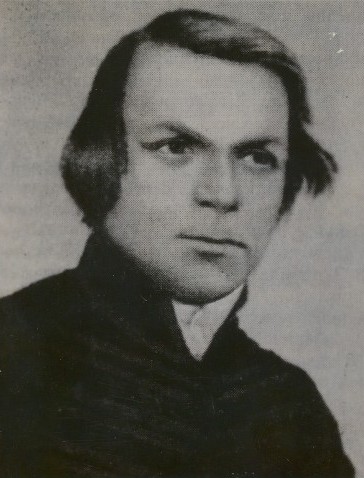Vahylevych, Ivan
Vahylevych, Ivan [Vahylevyč] (pseuds: Dalibor, Volk Zaklyka), b 2 September 1811 in Yasen, Stanyslaviv circle, Galicia, d 10 May 1866 in Lviv. (Photo: Ivan Vahylevych.) Romantic poet, philologist, and ethnographer of the Galician revival. In the years 1829–39, while studying at Lviv University and at the Greek Catholic Theological Seminary in Lviv, he associated with Markiian Shashkevych and Yakiv Holovatsky, and the three of them formed the Ruthenian Triad. During that time he repeatedly interrupted his studies to conduct archeological and ethnographic fieldwork in Western Ukrainian villages. Because of his populist activities, cultural nationalist views, and correspondence with scholars in the Russian Empire, such as Mikhail Pogodin, Izmail Sreznevsky, and the Ukrainians Mykhailo Maksymovych and Osyp Bodiansky, he suffered harassment by the church and Austrian civil authorities. He was ordained in 1846, and served as pastor in Nestanychi, Zolochiv circle. During the Revolution of 1848–9 in the Habsburg monarchy, as a supporter of a democratic Polish-Ukrainian political federation, he accepted the Ruthenian Congress's invitation to edit its weekly, Dnewnyk Ruskij, in Lviv. Later that year he left the Uniate church in protest against the church hierarchy's sanctions against him and converted to Lutheranism. Ostracized by most Ukrainians and by the church because of his ‘pro-Polish’ politics and his conversion, he was unable to find steady work until 1862, when he was appointed city archivist in Lviv.
Vahylevych wrote poetry in Polish in the years 1829–41. In 1836 he wrote a Ukrainian vernacular prose rendition of the Kyivan Rus’ epic Slovo o polku Ihorevi (The Tale of Ihor's Campaign, pub 1884). He coedited the first Galician Ukrainian almanac, Rusalka Dnistrovaia (1836). He contributed pioneering articles on the Hutsuls (1838–9), vampires and witches (1840), and the Boikos (1841) to the annual, Časopis, of Prague's Czech Museum, and other ethnographic articles to Polish periodicals (Przegląd Naukowy, Biblioteka Warszawska, Biblioteka Ossolińskich). In 1840, with A. Bielowski, he translated into Polish and annotated the Rus’ Primary Chronicle (pub 1864). In an unpublished treatise (1841–9) on the Ukrainian language (‘Southern Rus’ language), he was one of the first to treat that language as distinct from Russian and Polish; he divided it into Galician and Kyivan dialectal groups. Those views were also expressed in his published Polish grammar of the ‘Little Ruthenian’ language in Galicia (1845) and ‘Little Ruthenian’ grammar for elementary schools (1846), which were modeled on the grammar of the Russian N. Grech. In them he employed a 16th- and 17th-century orthography rather than one based on the vernacular, because he believed it to be ‘pure Ruthenian.’ In 1848 in Dnewnyk Ruskij, Vahylevych published political articles on Ukraine as a separate cultural entity, on the need for education in the vernacular, and on the need for Ukrainian-Polish co-operation on the basis of democracy, autonomy, and equality, and he provided one of the earliest surveys of Ukrainian literature. He also wrote a pioneering booklet on the Maniava Hermitage (1848). Among his unpublished works are a dictionary with over 10,000 Ukrainian words (1834–44), materials for a Ukrainian-German-Latin dictionary and for books on ethnography of the Carpathian Mountains regions and Lviv's historical monuments, studies of Slavic demonology, symbolism, and wedding and birth rituals, collections of folk songs about the opryshoks, and a collection of Ukrainian Christmas carols (of which he had gathered 280). Although he wrote mostly in Polish, he remained true to his Ukrainophile and democratic principles to the end of his life.
The fullest editions of Vahylevych's works were published together with Markiian Shashkevych's and Yakiv Holovatsky's in Lviv in 1913 and in Kyiv in 1982. O. Dzoban's guide to Vahylevych's unpublished manuscripts and biographical materials appeared in Lviv in 1986.
BIBLIOGRAPHY
Brock, P. ‘Ivan Vahylevych (1811–1866) and the Ukrainian National Identity,’ in Nationbuilding and the Politics of Nationalism: Essays on Austrian Galicia, ed A. Markovits and F. Sysyn (Cambridge, Mass 1982)
Shalata, M. (ed). Narodni pisni v zapysakh Ivana Vahylevycha (Kyiv 1983)
Dem'ian, H. Ivan Vahylevych—istoryk i narodoznavets’ (Kyiv 1993)
Roman Senkus
[This article originally appeared in the Encyclopedia of Ukraine, vol. 5 (1993).]

